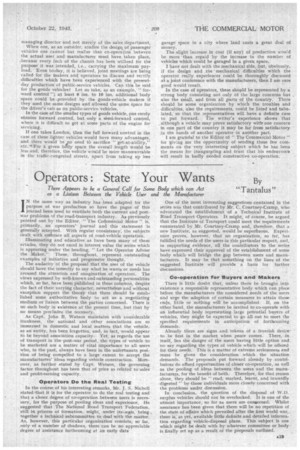Operators: State Your Wants
Page 25

If you've noticed an error in this article please click here to report it so we can fix it.
There Appears to he a General Call for Some Body which can Act as a Liaison Between the Vehicle User and the Manufacturer
By "Tantalus"
IN the same way as industry has been adapted for the purpose of war production so have the pages of this journal been used to ventilate both the current and postwar problems of the road-transport industry, As previously pointed out by the Editor, " The Corhmercial Motor" is, primarily, an operators'-journal and this statement is generally accepted. With regular consistency, the subjects dealt with embrace all aspects of ,road-vehicle operation.
Illuminating and educative as have been many of these articles, they do not excel in interest value the Series which is appearing under the heading, "-Let the Operator Advise the Maker." These, throughout, represent outstanding examples of initiative and progressive .thought.
The audacity of the proposal that the .user of the Vehicle should have the temerity to say what he wants or needs has aroused the attention and ' imagination of operators. The views expressed by well-known and outstanding personalities which, so far, have been published in these columns, despite. the fact of their varying character, nevertheless and without exception support the theory that there should he established. some authoritative body to act as a negotiating medium or liaison between the parties concerned. There is no such body in existence at the present time, but that by
no means precludes the necessity. . . . As Capt. John B. Watson maintains with considerable
frankness, the national and other associations are so immersed in domestic and local matters that the vehicle, as an entity, has been forgotten, and, in fact, would appear to be beyond association capacity. Yet, as regards the use of transport in the-post-war period, the types of vehicle to be marketed are a matter of vital importance to all users who, in the past, always have been in the unfortunate position of being compelled to a large extent to accept the manufacturers' ideas regarding vehicle. construction. Moreover, as further stated by Capt. Watson, the governing factor throughout has been that of price as related to sales and profit-earning capacity,
Operators Do the Real Testing
In the course of his interesting remarks, Mr. J. S. Nicholl staterlsEhat it is for the .operatoisto do the real testing and that a closer degree of co-operation between users is necessary, for the purpose of pooling ideas and experience. He suggestedthat The National Road Transport Federation, still in process of formation, might, under its-wgis, bring-. together a technical subcommittee to -deal with the matter. As, however, this particular organization consists, so far, only of a number of shadows, there can be no appreciable degree of assistance forthcoming at an early date One of the most interesting suggestions contained in the series was that contributed by Mr. C. Courtney-Cramp, who advocated ihe establishment -of a Technical Institute of Road Transport Operators. If might, of course, be argued_ that the Institute of Transport could meet the requirements enumerated by.Mr. Courtney-Cramp and, therefore, that a new Institute, as suggested, would be superfluous. Experience proves, however, that no organization, so far, has fulfilled the needs of the users-in this particular respect, and, in supporting evidence, all the contributors to the series have expressed their approval of the establishment of some bodywhich will bridge the gap between users and manufacturers. It may be that .something on the lines of the suggested Institute will provide a basis for further discussions.
Co-operation for Buyers and Makers There is little doubt that, unless there he brought into . existence a responsible representative body which can place before the manufacturers the considered needs of the users and urge the adoption of certain . measures to attain those ends,little or nothing will be accomplished. If, on the other hand, the manufacturers be invited to co-operate with an influential body representinglarge potential buyers of vehicles, they might be expected to -go all out to meet the specified requirements in anticipation of forthcoming 'demands.
Already there are signs .and tokens of a feyerish desireto be first in the market when peace comes. There, in itself, lies the danger of the users having little option and no say regarding the types of vehicle which will be offered for their needs. This is a matter of extreme seriousness and must be given the consideration Which the situation demands. The proposals put forward already by contributoss do afford opportunities of closer co-operation, as well as thepooling of ideas between the users and the manufacturers, for the benefit of both: Thereforesfor that reason alone, they should be " read, marked, learnt, and inwardly digested " by those individuals more closely concerned with the problem's under discussion.
In conclusion, the question of the disposal. of W.D.surplus vehicles should not be overlooked. It is one of the utmost importance, so far as users are conserned. Whilst assurance has been given that there will be no repetition of the state of affairs which prevailed after the first world war,. there is, as yet, available little definite and detailed information regarding vehicle-disposal plans. This subject is one which might be dealt with by whatever committee or body is finally set up as a result of the proposals outlined,




















































